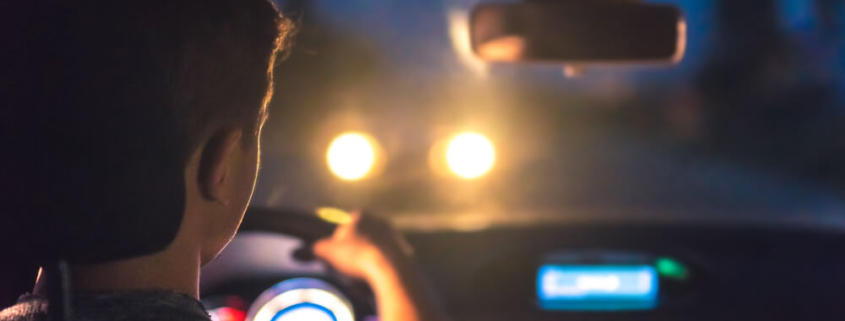How to Stay Safe When Driving a Car at Night
Despite the fact that there are fewer drivers at night, a surprising number of accidents occur after dark. There are certain dangers inherent to nighttime driving, but the good news is that you can avoid a lot of them. Being mindful about how you drive at night can help you keep yourself and others safe while behind the wheel. Use these tips to stay safe.
Challenges of Nighttime Driving
Knowing the dangers of nighttime driving is often enough to help you make important tweaks and changes to your driving habits. While driving during the daytime means dealing with more traffic, nighttime driving brings less visibility and the potential for unseen obstacles. While you’re less likely to encounter other drivers at night, the ones you do come across are more likely to be impaired or fatigued. Additionally, you are more likely to be fatigued while driving at night, which is a huge risk factor for serious accidents.
There’s a lot you can do to combat these challenges:
Staying Well-Rested and Alert
Staying alert and well-rested is crucial when you know you’ll be driving at night. It’s only natural to be fatigued at night—your body naturally produces melatonin as it starts to get dark outside, preparing you for sleep. While you can’t fight your body’s natural tendencies, you can get a nap before a long night of driving, make sure you have plenty of caffeine sources available, and be extra cognizant of any signs of fatigue.
One thing you can do to stay alert is keep yourself entertained while driving. This is a hard balance to strike; you want to be entertained enough to stay awake, but not so entertained that you are distracted from the road. Choose music that will make you sing along, but not to the extent that you’re performing a private concert. Pick a podcast that keeps you engaged, but not to the point that you’re having difficulty watching the road.
Safe Driving Techniques
A few quick changes to your driving habits can prepare you for a nighttime drive. First, leave plenty of space between you and the vehicle ahead of you—more than you would during the day. It’s harder to judge distance properly at night, and this gives you extra time to stop. You’ll also want to reduce your speed to a point that allows you to stop within the distance you can see ahead of your vehicle. It’s easy to drive too fast at night, particularly when there are limited vehicles around, so pay careful attention to your speed.
As you drive, keep an eye out for road signs. They can help you avoid unexpected obstacles—for example, signs on rural roads may alert you to stop signs coming up, allowing you to start slowing down. You should also be on the lookout for wildlife. Deer and other animals often cross the road at night, and it can be hard to see them until it’s too late to stop.
If you use GPS to get from point A to point B, have the addresses loaded into your phone before you begin driving. If your route takes you through rural areas, see if you can download the route to your phone—a dropped connection in the middle of a rural area at night could leave you lost and panicked. You can also use this time to check for rest stops, gas stations, and other convenient break points along your route.
Vehicle Maintenance and Safety
Making sure that your vehicle is safe to drive before you pull out of your driveway is vital. Check your lights, since a burnt-out light could keep other drivers from seeing you and cause a crash. Before you leave, turn on your windshield cleaner and verify that the blades wipe cleanly. Inspect your fuel levels so you know when you need to stop.
Involved in an Accident? Call Kingbird Legal Now
If you or someone you love has been hurt in a car accident, don’t wait any longer to find out if you’re entitled to compensation. Call Kingbird Legal at 484-289-4880 or send us a message online to schedule a consultation right away.

 Being mindful about how you drive at night can help you keep yourself and others safe while behind the wheel. Use these tips to stay safe.
Being mindful about how you drive at night can help you keep yourself and others safe while behind the wheel. Use these tips to stay safe.
 The role of mediation in personal injury cases
The role of mediation in personal injury cases
Leave a Reply
Want to join the discussion?Feel free to contribute!